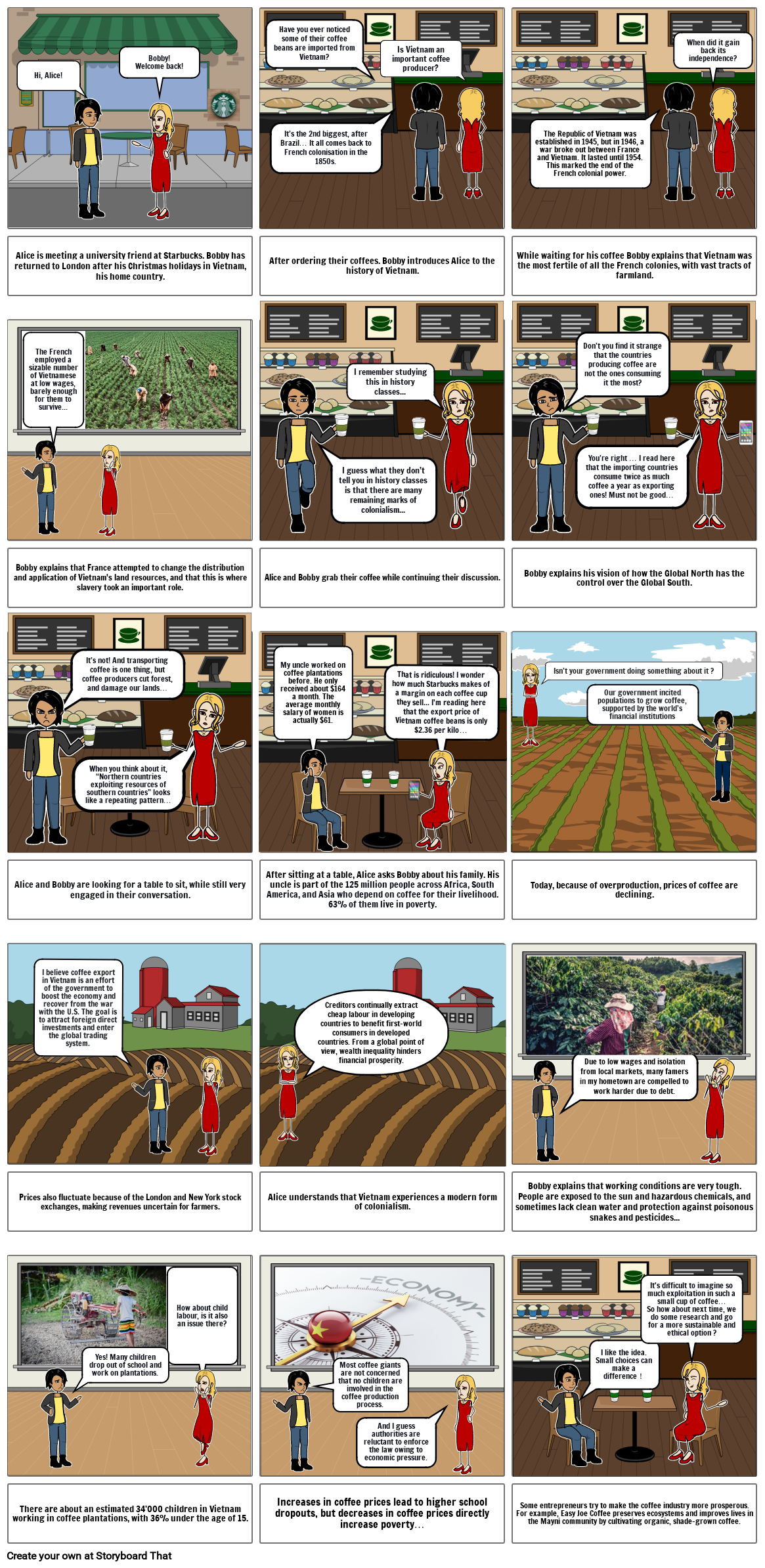The underside of the coffee industry

Storyboard Text
- Hi, Alice!
- Bobby!Welcome back!
- Have you ever noticed some of their coffee beans are imported from Vietnam?
- It’s the 2nd biggest, after Brazil… It all comes back to French colonisation in the 1850s.
- Is Vietnam an important coffee producer?
- The Republic of Vietnam was established in 1945, but in 1946, a war broke out between France and Vietnam. It lasted until 1954. This marked the end of the French colonial power.
- When did it gain back its independence?
- Alice is meeting a university friend at Starbucks. Bobby has returned to London after his Christmas holidays in Vietnam, his home country.
- The French employed a sizable number of Vietnamese at low wages, barely enough for them to survive...
- After ordering their coffees. Bobby introduces Alice to the history of Vietnam.
- I guess what they don’t tell you in history classes is that there are many remaining marks of colonialism...
- I remember studying this in history classes...
- While waiting for his coffee Bobby explains that Vietnam was the most fertile of all the French colonies, with vast tracts of farmland.
- Don’t you find it strange that the countries producing coffee are not the ones consuming it the most?
- You’re right … I read here that the importing countries consume twice as much coffee a year as exporting ones! Must not be good…
- Bobby explains that France attempted to change the distribution and application of Vietnam's land resources, and that this is where slavery took an important role.
- It’s not! And transporting coffee is one thing, but coffee producers cut forest, and damage our lands…
- Alice and Bobby grab their coffee while continuing their discussion.
- My uncle worked on coffee plantations before. He only received about $164 a month. The average monthly salary of women is actually $61.
- That is ridiculous! I wonder how much Starbucks makes of a margin on each coffee cup they sell... I'm reading here that the export price of Vietnam coffee beans is only $2.36 per kilo…
- Bobby explains his vision of how the Global North has the control over the Global South.
- Isn’t your government doing something about it ?
- Our government incited populations to grow coffee, supported by the world’s financial institutions
- Alice and Bobby are looking for a table to sit, while still very engaged in their conversation.
- When you think about it, “Northern countries exploiting resources of southern countries” looks like a repeating pattern…
- After sitting at a table, Alice asks Bobby about his family. His uncle is part of the 125 million people across Africa, South America, and Asia who depend on coffee for their livelihood. 63% of them live in poverty.
- Today, because of overproduction, prices of coffee are declining.
- I believe coffee export in Vietnam is an effort of the government to boost the economy and recover from the war with the U.S. The goal is to attract foreign direct investments and enter the global trading system.
- Creditors continually extract cheap labour in developing countries to benefit first-world consumers in developed countries. From a global point of view, wealth inequality hinders financial prosperity.
- Due to low wages and isolation from local markets, many famers in my hometown are compelled to work harder due to debt.
- Prices also fluctuate because of the London and New York stock exchanges, making revenues uncertain for farmers.
- Yes! Many children drop out of school and work on plantations.
- How about child labour, is it also an issue there?
- Alice understands that Vietnam experiences a modern form of colonialism.
- Most coffee giants are not concerned that no children are involved in the coffee production process.
- Bobby explains that working conditions are very tough.People are exposed to the sun and hazardous chemicals, and sometimes lack clean water and protection against poisonous snakes and pesticides...
- I like the idea. Small choices can make a difference!
- It's difficult to imagine so much exploitation in such a small cup of coffee…So how about next time, we do some research and go for a more sustainable and ethical option ?
- There are about an estimated 34'000 children in Vietnam working in coffee plantations, with 36% under the age of 15.
- Increases in coffee prices lead to higher school dropouts, but decreases in coffee prices directly increase poverty…
- And I guess authorities are reluctant to enforce the law owing to economic pressure.
- Some entrepreneurs try to make the coffee industry more prosperous. For example, Easy Joe Coffee preserves ecosystems and improves lives in the Mayni community by cultivating organic, shade-grown coffee.
Over 30 Million Storyboards Created
No Downloads, No Credit Card, and No Login Needed to Try!
